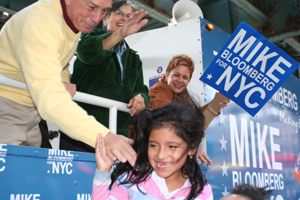By Maurice Pinzon
Shortly before Mayor Michael R. Bloomberg was re-elected for another term, Stanley Aronowitz, a sociology professor at the CUNY Graduate Center, reflected on the implications of a sizeable Bloomberg electoral victory. He was prompted by a New York News Network article concerning a mayoral endorsement from Ronnie M. Eldridge.
Professor Aronowitz, who has written extensively about work, technology, culture and the American labor movement, had nothing positive to say about mayoral candidate Fernando Ferrer. Instead, Professor Aronowitz suggested that Mr. Ferrer badly articulated the “two New Yorks” concept in the midst of a highly ineffective campaign.
“Ferrer is a political bum,” he said.
However, Prof. Aronowitz pointed out that a landslide victory for Mayor Bloomberg could be viewed as a mandate by the Bloomberg administration to implement their policies unchallenged.
“Bloomberg,” Prof. Aronowitz said, “is a bad figure as far as union negotiations” are concerned. He questioned the support Mayor Bloomberg was receiving from New York liberal sectors.
Prof. Aronowitz said, “Don’t people who support Bloomberg ”” who are otherwise progressive ”” understand that this guy is not only a rich guy, I mean in the most obscene use of his money, but that he’s bullied the municipal unions? He’s demanded that every dime that they get in wage increases be paid back by giving up time, giving up rights.”
Last Wednesday, during the transit workers’ strike, about 15 bus drivers expressed how much they were giving up to go on strike. They were assembled in front of the College Point Bus Depot around a fire in a garbage can to keep warm.
Most agreed that their hand had been forced by the Metropolitan Transportation Authority (MTA). Many drivers were eager to explain their reasons for going on strike and dispute the negative image they had been given by the mayor and the media. They stood united with the leadership of TWU Local 100 during their dispute with the MTA.
These drivers had previously worked for the privately-owned Queens Surface Corporation, which the City had acquired earlier this year and incorporated into the MTA. Months later, the workers explained, their contract was not yet negotiated, which according to the Transit Workers Union (TWU) Local 100 meant that they were not subject to New York State’s Taylor Law, which prohibits public service employees from going on strike.
Under the TWU’s two-phase walkout, the former Queens Surface transit drivers went on strike first. They did so knowing that they probably would not benefit from a strike settlement, since their contract negotiations would take place separately from the rest of the transit workers, who had a longer history of working under the MTA.
The drivers were quick to defend themselves from Mayor Bloomberg’s harsh words recorded by various media outlets.
On the first day of the full strike, after walking across the Brooklyn Bridge to City Hall, Mayor Bloomberg held a news conference and read from what appeared to be a prepared statement. He said, “The leadership of the TWU has thuggishly turned their backs on New York City and disgraced the noble concept of public service.”
Later responding to a question, Mayor Bloomberg added, “This selfish strike is illegal.”
But Prof. Aronowitz, in his book “Ashes of the Old, American Labor and America’s Future,” explains how labor is there with or without the leadership. Prof. Aronowitz wrote, “It’s not that unions ”˜organize’ workers who would otherwise remain dormant. In many, perhaps most, instances, workers organize themselves.”
Indeed, at the College Point Bus Depot, workers debated, disagreed, provided examples and counter-examples of their grievances ”” in many ways organizing themselves on the picket line.
The workers took great exception with all that was in the air about them and their leaders, notwithstanding Mayor Bloomberg’s fuzzy distinction between the TWU leadership and the transit workers.
One worker, who would only give his first name ”” Norman ”” interjected as his fellow drivers spoke to this reporter.
Norman admitted that he had his differences with TWU president Roger Toussaint. But he said, “I’m listening to NY1 and newspapers, and we’re being called a thug union.”
With his eyes watering from the cold, the fire ”” or perhaps simple emotion ”” Norman posed a rhetorical question: “Let me ask you who the thugs are.”
Norman said the MTA was like “a state within the state” with control over mass transit, bridges, tunnels, and various other properties. He pointed out that millions of dollars goes into the MTA, but the agency holds little accountability even as it maintains control over so much money, power, and property. He and other strikers on the picket line wondered out loud how the MTA had suddenly “found” a $1 billion surplus in their budget.
Norman said, “Let me tell you something. I go home, $10 is missing out of my pocket ”” I’m tearing the [expletive] house apart looking for that $10. All right, I know I had $10, where the [expletive] is that $10?”
Norman rejected the characterization of him and his colleagues as selfish, saying, “Not only did we not want to go out for their sake because on Christmas season” that would hurt commuters, “but ask how many people have families,” he said, gesturing toward the workers by the picket line. He pointed out that the families of the workers at this very depot also would suffer greatly as a result of the strike.
Norman summed it up with, “It’s about what you gotta do.”
“Sometimes you gotta do what you don’t want to do, just to get what you need,” he added.
He and other strikers also railed against the Taylor Law.
Norman scoffed, “They turn around and they say this is what you are gonna get, take it or leave it. And by the way, you cannot go on strike because it’s illegal.”

